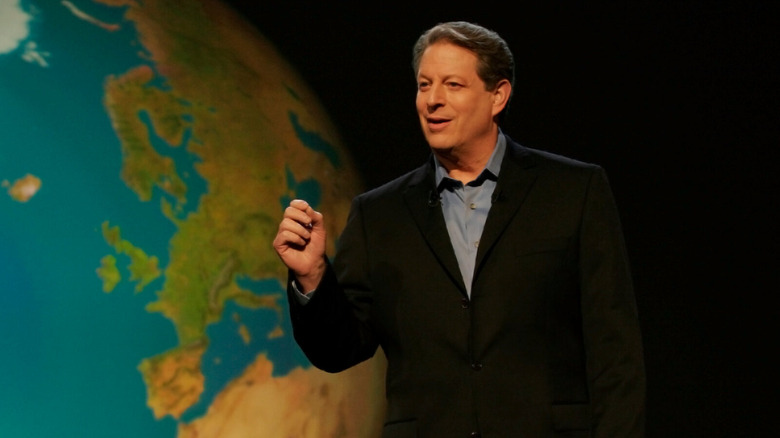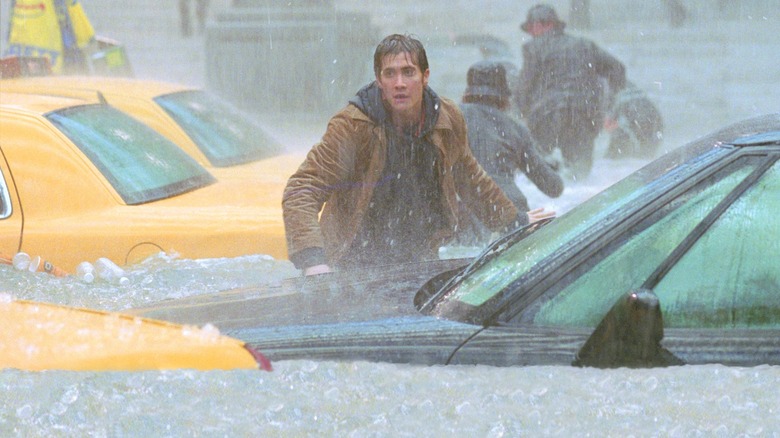Al Gore's An Inconvenient Truth Exists Thanks To This Jake Gyllenhaal Movie
Former Vice President Al Gore's 2006 documentary "An Inconvenient Truth" helped a lot with opening people's eyes to the realities of climate change, to the point where even the Republican presidential candidate in 2008 campaigned on addressing the issue. It's rare for any documentary to have the reach this one did, especially one about a topic no one really loves to think about. Gore had his doubts about the project too, but a 2004 blockbuster helped assuage them.
"The Day After Tomorrow" producer Mark Gordon once recalled meeting Gore in 2007, after "An Inconvenient Truth" had become a massive hit, and hearing the former VP partially credit the 2004 movie for the doc's success. "Look, we made this documentary, and a number of people saw it," he remembered Gore telling him in a 2025 piece by The Hollywood Reporter. "We're incredibly proud of it, but the amount of people that saw 'Day After Tomorrow,' in spite of the fact that it was a pop movie, alerted so many tens of millions of people to climate change."
Speaking to THR in 2016, "An Inconvenient Truth" producer Laurie David separately recalled meeting Gore at a panel discussion in 2004, at a time where the Roland Emmerich-directed "Day After Tomorrow" was making waves at the box office. "I was working on global warming issues, and when 'The Day After Tomorrow' came out, I was asked to moderate a panel discussion at the New York Society for Ethical Culture," David explained. "Al Gore came onstage and presented five minutes' worth of slides about global warming, and I was floored. My eyes welled up with tears. It was really clear: We had to make a movie."
Would "An Inconvenient Truth" have been made at all if not for this silly film where Jake Gyllenhaal get chased across New York City by a giant, flash-freezing cyclone? It's not clear, but the existence of Emmerich's movie sure seemed to give Gore and his team more of the confidence they needed to follow through on the project.
The Day After Tomorrow has a mixed legacy among climate change activists
Although Emmerich's blockbuster certainly raised some awareness about climate change, not every climate change activist has appreciated its impact on the popular consciousness. The chief complaint is that "The Day After Tomorrow" doesn't get any of the science right, something that's crucial to do if you know you're the underdog in an ongoing debate. Much has been written about how those flash-freezing cyclones aren't possible, nor is another ice age a likely result of the current greenhouse gas effect we're seeing. (And even if it was, it wouldn't happen this quickly.) The movie offers a fundamentally unserious, over-the-top depiction of climate change. In other words, it presents itself as a giant strawman for climate change skeptics to dunk on.
Still, as Gore seemed to understand, the purpose of "The Day After Tomorrow" was not to present the problem of climate change with airtight scientific rigor. Its goal was to entertain first, educate second, and to trust that the audience understands that the type of climate crisis presented here is more of a metaphor than a direct prediction. Most importantly, "The Day After Tomorrow" proved that climate fiction could be popular. You can draw a line from the success of this movie to the success of "Twisters" 20 years later. (That film was also not exactly scientifically accurate, not that any of us care.)
Despite its inaccurate science, "The Day After Tomorrow" did undeniably get people talking more about climate change, which is honestly all you can hope for with a big, silly disaster movie like this one. The absurdity of the weather in this film also helped to downplay the preachiness of its actual script; with all the grandiose monologues explaining to the audience how we should take better care of our planet, the film threatened to fall into the same trap as "Don't Look Up" (i.e. feeling more like a lecture than a proper movie).
All the "ridiculous" parts of "The Day After Tomorrow," from the evil wolves subplot to the giant Hollywood-destroying tornadoes, helped to at least assure the more defensive members of the audience that this was not a movie that thought it was better than them. It may be easy to poke holes in this film's science, but its long-lasting cultural impact cannot be denied.

